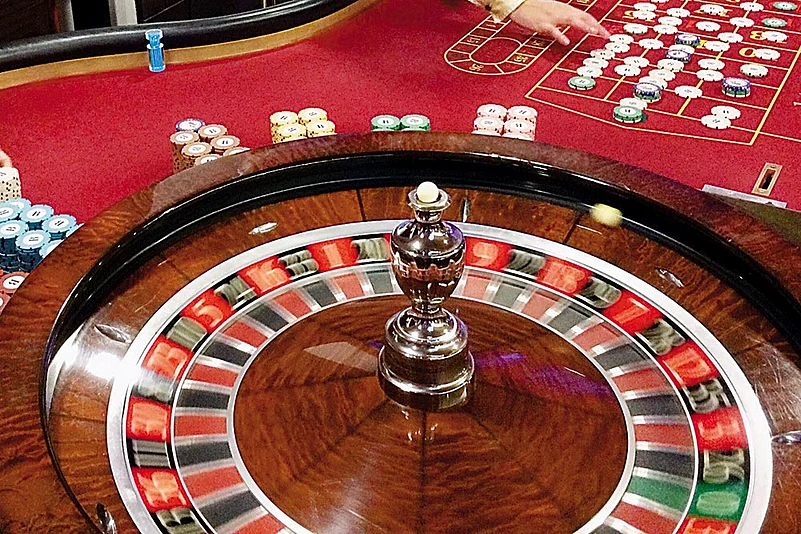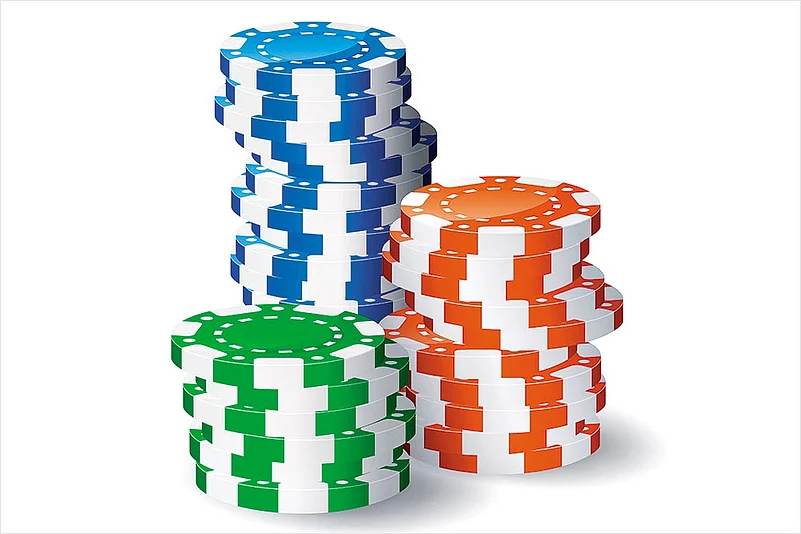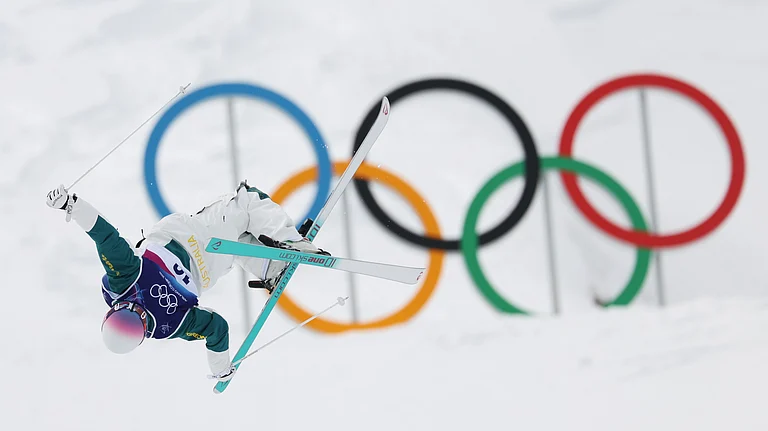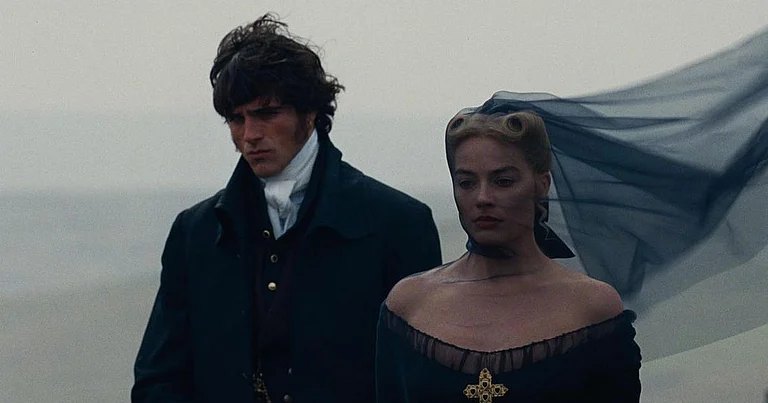The atmosphere inside Casino DeltinDenzong is electrifying and addictive. All throbbing and thriving within a signature Sikkimese style, from sight to sound. The tickety-tock at the roulette table; the jingle of slot machines, and the distinctive swoosh of a croupier shuffling cards. Amidst the live entertainment, a first-time gambler jumps for joy—the delirious thrall of beginner’s luck. And true to Paul Newman’s “a dollar won is twice as sweet as a dollar earned” in The Color of Money, the players wager away, savouring their aperitif slowly.
Welcome to Gangtok, the Las Vegas of India! Breathtaking Himalayan views, Sikkimese hospitality, pleasant climate, pure air and casinos on the side. The last one is the new calling card. Sikkim is the country’s first state to have onshore, or land-based, casinos after it legalised gambling in 2009 to lure visitors. The only other place to have casinos is Goa, where a quirk of law keeps the pastime off the coast, on ships in the sea. Gambling—a taboo in many communities across India—is illegal in most states but that hasn’t sapped people’s appetite for it. The proof is penny-stake games at street corners and card parties in affluent homes. Illicit and untaxed!
But attitudes are slowly changing as beachy Goa and hilly Sikkim have shown how gambling can be harnessed as a revenue generator and tourist draw. “Indians are by and large compulsive gamblers and there is a burgeoning middle-class that wants to spend money. And gamble. Sikkim is smart enough to realise how much revenue it can earn from this…,” says Thinley Namgyal Densapa, proprietor of Denzong Regency, a Welcome Heritage luxury mountain retreat, one of Gangtok’s two five-star hotels to operate casinos.

A roulette wheel
The Gangtok casinos offer a wide range of games—roulette, blackjack, baccarat, kitty, mini flush, Caribbean stud poker, Texas house poker, andar-bahar, mang patti (both famous in southern India), and teen patti or flash (the three-card poker game, an all-time Indian favourite). For many Indians, gambling is considered propitious around Diwali, with crores of rupees won or lost during night-long sessions of teen patti or flash.
DeltinDenzong, opened in 2017, is inside Denzong Regency spread over 10 acres of wooded property. It is promoted by the Jaydev Mody-owned Delta Corp, the only listed gaming company in India. The other one is Mahjong—the first licensed, land-based, live five-star casino in the country, operating since 2011. It is owned and run by Trio Ventures Private Limited. Mahjong sits within the sprawling Mayfair Spa and Resorts on the outskirts of Gangtok, whose proprietor is Dilip Ray of Odisha-based Mayfair Hotels & Resorts.
The casinos have helped create jobs and generate tax and tourism revenue. From the croupiers to the concierge, the pit bosses to the bouncers, the staff comprises locals mostly. Almost 90% of the 140-member staff at DeltinDenzong is Sikkimese. “The dealers are trained in Singapore and Goa for six months before they are deployed at the gaming tables. They are constantly supervised by a senior,” says a senior staff member of the casino. Cheat check is part of house rules. Close-circuit cameras monitor each move and dealers are changed every 20 minutes.
The casinos in Gangtok have a cover charge. Deltin offers three packages—regular, premium and VIP—of Rs 2,500, Rs 3,500 and Rs 7,000. The government keeps Rs 1,000 as tax. “Regulars” get Rs 1,500 worth of one-time chips and complementary snacks, dinner, unlimited drinks and entertainment. “Premium” players get chips worth Rs 2,500, food and select alcohol such Scotch whiskys. Johnnie Walker, Chivas Regal et al. The “VIPs” are treated er, like VIPs—Rs 7,000 in chips (the tax is on the house), food and expensive drinks. Jack Daniel’s, Hennessy, Glenfiddich…
Mahjong caters to a casual crowd, happy with small bets and the pleasure of splashing out 100-rupee notes on risqué dancers gyrating under disco balls to the beats of catchy Bollywood numbers. It has a single package: Rs 3,200. The patrons get Rs 1,000 in chips, the state government keeps Rs 1,000 and Rs 700 goes to central GST.
Legal gambling or betting—in horse races, trackside punting, for instance, and in casinos—generates revenues close to $400 million in India each year from an estimated turnover of $20 billion. That’s a ballpark figure, although official. How much money is wagered illegally is anybody’s guess. Sikkim officials declined comments on the government’s share of the earning, but a back-of-the-envelope calculation indicates Rs 20 crore a year for the state exchequer from just three casinos.

The gaming operators want to up their stakes, catching the high rollers, those who fly to Macau or Las Vegas for their fix. The problem is connectivity. National highway 10 is the only road connecting this wisp of a mountain land to the rest of India. An airport—the Greenfield Pakyong, about 23km east of Gangtok—will be start operating from October 4. The casino owners are betting big on it. “Once the airport opens we will be able attract big spenders and do better business,” says Mahjong general manager Sherap Lepcha, a former football star, who represented top Indian clubs such as East Bengal, Mohun Bagan and Churchill Brothers of Goa. Densapa agrees, and suggests a helipad to bring the deep pockets.
They need the high-end traffic as the casinos are off-limits for the Sikkimese. These have been favoured nightly hangouts for the well-heeled residents until the state amended the Sikkim Casinos (Control & Tax) Rules in July 2016 to ban locals from entering, and gambling in, these places. “We now mostly get small-time players from the Darjeeling hills, Bihar, Siliguri and sometimes from the northeastern states and Nepal,” Lepcha says.
The middle-class mass-market gamblers are taking up the slack at the moment. Gangtok doesn’t immediately scream Vegas glitz. There’s no neon-lit billboard, no soaring tower of glass and steel. It’s an open question whether the casinos can meet the lofty financial goals, including covering the Rs 5 crore licence fee paid to the government every year.
The challenges of keeping patrons coming will only magnify when the airport opens. But it’s not for nothing that gambling is called a “game of chance”, a lighthearted promise of a good time and a possible jackpot. That’s probably just a spin of the roulette away. And the die is already cast.
By Probir Pramanik in Gangtok


























